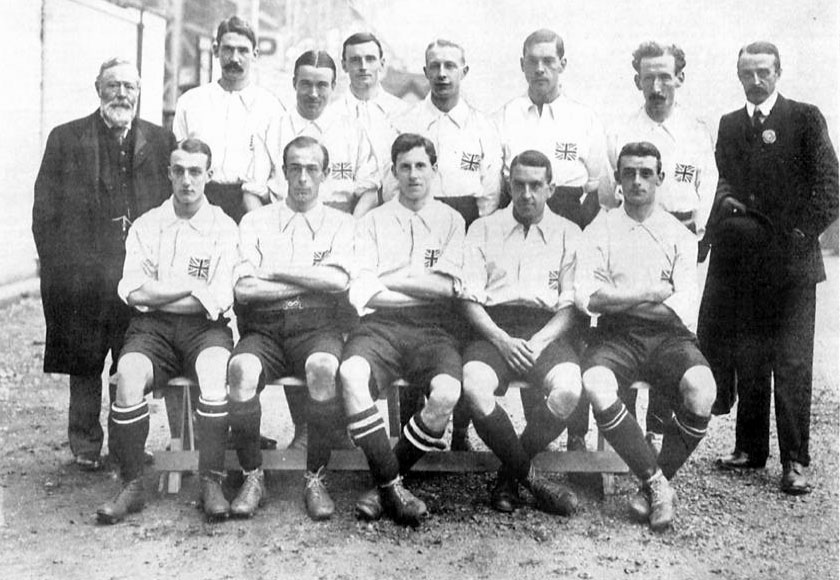Difference between revisions of "Origins of Modern Football in England"
From Londonhua WIKI
Cmtillotson (talk | contribs) |
Cmtillotson (talk | contribs) |
||
| Line 31: | Line 31: | ||
It is most difficult to determine an origin of when football, the modern game we know today, truly began. The reason for this comes from how we wish to define the game itself. Ball games have been a part of British culture for hundreds of years, but the first recognizable versions of the game we know today have only arrived recently.<ref>Mason, T. (1981). Association football and English society: 1863-1915. Brighton: The Harvester Press. P.P. 9</ref><ref>Taylor, M. (2008). The Association Game: A History of British Football. Harlow : Pearson Education Limited. P.P. 19</ref> Britain is similar to other nations in the way that sports developed as a recreational activity, and football is no exception. The reason it was unrecognizable up until 1863 is that every local area in Britain had it's own version of the game.<ref>Taylor, M. (2008). The Association Game: A History of British Football. Harlow : Pearson Education Limited. P.P. 20</ref> Some versions had slight similarities but a vast majority included the use of hands, or more closely resembled what would later become rugby.<ref>Mason, T. (1981). Association football and English society: 1863-1915. Brighton: The Harvester Press. P.P. 9</ref> | It is most difficult to determine an origin of when football, the modern game we know today, truly began. The reason for this comes from how we wish to define the game itself. Ball games have been a part of British culture for hundreds of years, but the first recognizable versions of the game we know today have only arrived recently.<ref>Mason, T. (1981). Association football and English society: 1863-1915. Brighton: The Harvester Press. P.P. 9</ref><ref>Taylor, M. (2008). The Association Game: A History of British Football. Harlow : Pearson Education Limited. P.P. 19</ref> Britain is similar to other nations in the way that sports developed as a recreational activity, and football is no exception. The reason it was unrecognizable up until 1863 is that every local area in Britain had it's own version of the game.<ref>Taylor, M. (2008). The Association Game: A History of British Football. Harlow : Pearson Education Limited. P.P. 20</ref> Some versions had slight similarities but a vast majority included the use of hands, or more closely resembled what would later become rugby.<ref>Mason, T. (1981). Association football and English society: 1863-1915. Brighton: The Harvester Press. P.P. 9</ref> | ||
<br><br> | <br><br> | ||
| − | |||
====Football in the Middle Ages==== | ====Football in the Middle Ages==== | ||
The types of "football" played in this time period only truly share the similarity with modern games in the way that they are played with a ball and are recreational in nature. The term football was coined in 1314 and was played throughout Britain and parts of mainland Europe.<ref>Taylor, M. (2008). The Association Game: A History of British Football. Harlow : Pearson Education Limited. P.P. 20</ref> Most of what we know about the sport in this time period comes from colloquial writings. It is said for a large part of the middle ages football was disliked by the public because it took many schoolboy's attentions away from archery.<ref>Mason, T. (1981). Association football and English society: 1863-1915. Brighton: The Harvester Press. P.P. 10</ref> | The types of "football" played in this time period only truly share the similarity with modern games in the way that they are played with a ball and are recreational in nature. The term football was coined in 1314 and was played throughout Britain and parts of mainland Europe.<ref>Taylor, M. (2008). The Association Game: A History of British Football. Harlow : Pearson Education Limited. P.P. 20</ref> Most of what we know about the sport in this time period comes from colloquial writings. It is said for a large part of the middle ages football was disliked by the public because it took many schoolboy's attentions away from archery.<ref>Mason, T. (1981). Association football and English society: 1863-1915. Brighton: The Harvester Press. P.P. 10</ref> | ||
Revision as of 16:34, 13 June 2017
History and Influence of Football's Commercialization in England
 | |
| English Amateur Football National Team London, England 1908 [1] |
Contents
Abstract
The paragraph should give a three to five sentence abstract about your entire London HUA experience including 1) a summary of the aims of your project, 2) your prior experience with humanities and arts courses and disciplines, and 3) your major takeaways from the experience. This can and should be very similar to the paragraph you use to summarize this milestone on your Profile Page. It should contain your main Objective, so be sure to clearly state a one-sentence statement that summarizes your main objective for this milestone such as "a comparison of the text of Medieval English choral music to that of the Baroque" or it may be a question such as "to what extent did religion influence Christopher Wren's sense of design?"
Introduction
I suggest you save this section for last. Describe the essence of this project. Cover what the project is and who cares in the first two sentences. Then cover what others have done like it, how your project is different. Discuss the extent to which your strategy for completing this project was new to you, or an extension of previous HUA experiences.
Section 1: History of British Football
Game Origins
In order to provide an accurate chronology for telling the story of British football there needs to be a distinction of when the sport of football actually originated. For the purposes of this milestone the history will be referred to in two separate sections to avoid confusion. The event that I will use separate these two periods of football history is the creation of the British Football Association, commonly known as the FA, in 1863.[2]
Pre-Association Football
Introduction to Pre-Association Football
It is most difficult to determine an origin of when football, the modern game we know today, truly began. The reason for this comes from how we wish to define the game itself. Ball games have been a part of British culture for hundreds of years, but the first recognizable versions of the game we know today have only arrived recently.[3][4] Britain is similar to other nations in the way that sports developed as a recreational activity, and football is no exception. The reason it was unrecognizable up until 1863 is that every local area in Britain had it's own version of the game.[5] Some versions had slight similarities but a vast majority included the use of hands, or more closely resembled what would later become rugby.[6]
Football in the Middle Ages
The types of "football" played in this time period only truly share the similarity with modern games in the way that they are played with a ball and are recreational in nature. The term football was coined in 1314 and was played throughout Britain and parts of mainland Europe.[7] Most of what we know about the sport in this time period comes from colloquial writings. It is said for a large part of the middle ages football was disliked by the public because it took many schoolboy's attentions away from archery.[8]
Association Football
History of Football in London
Section 2: Deliverable
In this section, provide your contribution, creative element, assessment, or observation with regard to your background research. This could be a new derivative work based on previous research, or some parallel to other events. In this section, describe the relationship between your background review and your deliverable; make the connection between the two clear.
Subsection 1
...use as many subsections or main sections as you need to support the claims for why what you did related to your Background section...
Subsection 2
...and so on and so forth...
Conclusion
In this section, provide a summary or recap of your work, as well as potential areas of further inquiry (for yourself, future students, or other researchers).
References
- ↑ Cook, T. A. (1908). The fourth Olympiad. London: Brit. Olymp. Assoc.
- ↑ Taylor, M. (2008). The Association Game: A History of British Football. Harlow : Pearson Education Limited. P.P. 20
- ↑ Mason, T. (1981). Association football and English society: 1863-1915. Brighton: The Harvester Press. P.P. 9
- ↑ Taylor, M. (2008). The Association Game: A History of British Football. Harlow : Pearson Education Limited. P.P. 19
- ↑ Taylor, M. (2008). The Association Game: A History of British Football. Harlow : Pearson Education Limited. P.P. 20
- ↑ Mason, T. (1981). Association football and English society: 1863-1915. Brighton: The Harvester Press. P.P. 9
- ↑ Taylor, M. (2008). The Association Game: A History of British Football. Harlow : Pearson Education Limited. P.P. 20
- ↑ Mason, T. (1981). Association football and English society: 1863-1915. Brighton: The Harvester Press. P.P. 10
